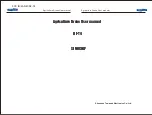
14
Flying Tips & Features
Tips for Safe Operation
• It is recommended to only fly in large, open spaces that are free of obstacles like
power lines, trees, ceiling fans, etc.
• When flying indoors, avoid walls and ceilings, as the craft will be drawn towards them
if closer than 2-3 feet.
• Stand behind the craft when first taking off, so that you and the craft are facing the
same “forward” direction. This will help with orientation when the craft is airborne.
• Novice pilots should move the controls slowly and deliberately to get used to the
craft’s flying characteristics. Try using one control at a time.
• Practice basic flight operations like take off, hovering, and landing.
• If you get into trouble or if anything obstructs the rotors, cut power immediately and
safely clear the obstruction. Check for possible damage before flying again.
Speed Setting
Press the
Speed
button on the remote to change the craft’s speed setting.
•
Low:
Provides smooth and predictable control of the craft. The remote will chime once
to indicate the low speed setting.
•
Medium:
The craft will move and respond faster to all control inputs. The remote will
chime twice to indicate the medium speed setting.
•
High:
Highest setting for maximum performance. The remote will chime three times to
indicate the high speed setting.
Headless Mode
While Headless Mode is active the craft will fly in whatever direction the
Right Control
Stick
is pushed, regardless of where the front of the craft is pointing. For example, if the
front of the craft was pointed straight ahead but is now pointed right 90°, when you push
forward on the stick the craft will fly forwards as if it was still pointed straight ahead. This
can be useful if you become disoriented while flying and cannot visually determine which
direction the craft is facing.
To activate Headless Mode, press the
Headless button
on the remote control. The LED
lights will slowly flash while Headless Mode is ON. Press the button again to deactivate
Headless Mode.

































